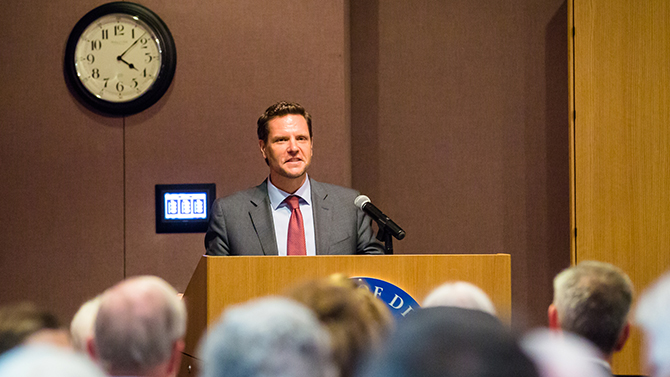


Shakespeare for the centuries
Photo by Jessica Eastburn September 09, 2016
Folger Library director discusses world’s ‘most successful storyteller’
When copies of Shakespeare’s First Folio, the landmark book containing 36 of the writer’s great plays, began the traveling exhibition that is bringing them to all 50 states, some unexpected things happened.
Among them were the various translations of the famous Hamlet speech that begins, “To be or not to be.” In the Dakotas, those translating the speech into the Lakota Sioux language had to choose from 10 different ways to say “to be.” In contrast, the Hawaiian language translators had no equivalent words for “to be.”
To Michael Witmore, director of the Folger Shakespeare Library, which organized the tour, those are just two of many examples of how different people and different times find varied meanings in Shakespeare’s words, even while those words resonate across the centuries.
“Every single place where this book goes, it is adapted” as people “make it their own,” Witmore said during a talk at the University of Delaware, where a First Folio is on view in University Museums’ Old College Gallery through Sept. 25.
But despite the adaptations and different perspectives, he said, “We can still find a common thread between Shakespeare’s century and our own.”
Witmore’s talk, “Shakespeare for the Centuries,” preceded an opening reception in Old College for the exhibition “First Folio! The Book that Gave Us Shakespeare.” The exhibition at UD is the only stop in Delaware for the rare 1623 book.
The Folger, which holds 82 copies of the First Folio and is the world’s largest Shakespeare collection, planned the national tour to commemorate the 400th anniversary of Shakespeare’s death.
Witmore spoke on Sept. 7 to a standing-room-only audience in Morris Library, which houses a related exhibition, “Shakespeare Through the Ages,” in its Special Collections.
He praised the University for its strong tradition in special collections and in the humanities and for developing a wide range of programming, from scholarly lectures to workshops for families, to accompany “First Folio!” The Folger, he said, believes that as many Americans as possible should have the opportunity to see the book in person.
Without the First Folio, put together by two of Shakespeare’s friends and published seven years after his death, half the plays would have been lost, Witmore said. Those include Macbeth, Julius Caesar, The Tempest and The Winter’s Tale.
Witmore noted that the First Folio was made possible by the relatively recent development of the printing press in Shakespeare’s time, a communications transformation that may seem similar to today’s digital revolution. Shakespeare, whose works can now be read and searched on mobile devices, “was perhaps the most successful content provider in history,” he said.
Witmore also described the different ways in which Shakespeare has been honored and commemorated over the years.
“The meanings of his words change [over time], and so do the ways we celebrate them,” he said.
Programming associated with First Folio
The First Folio will be on display at Old College Gallery through Sept. 25 and will be open to the public from noon until 8 p.m. on Wednesdays and from noon until 5 p.m. Thursdays through Sundays. The exhibition is free and open to the public.
Audiences are invited to connect to the exhibition through guided and self-guided tours, gallery talks, performances, film screenings and interactive workshops for all ages.
UD’s presentation of the First Folio, the accompanying exhibition “Illustrating Shakespeare: From Boydell to Baskin,” and programming is supported by the Morris Library, the departments of English, Music and Theatre, E-52 student theatre group, Delaware Shakespeare Festival and several other community partners. A schedule of programs is available at this University Museums website.
“First Folio! The Book that Gave Us Shakespeare” has been made possible in part by a major grant from the National Endowment for the Humanities: Exploring the human endeavor, and by the support of Google.org, Vinton and Sigrid Cerf, and other generous donors.
Contact Us
Have a UDaily story idea?
Contact us at ocm@udel.edu
Members of the press
Contact us at 302-831-NEWS or visit the Media Relations website

